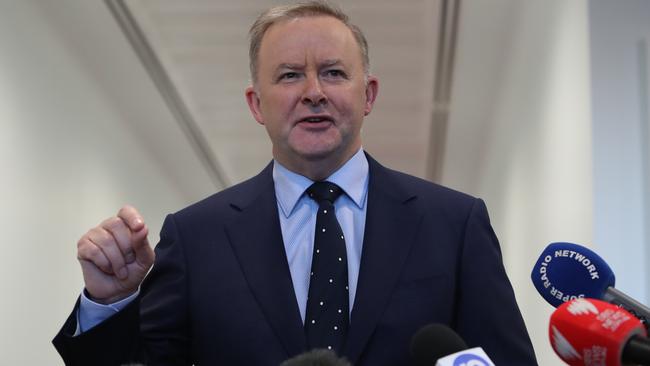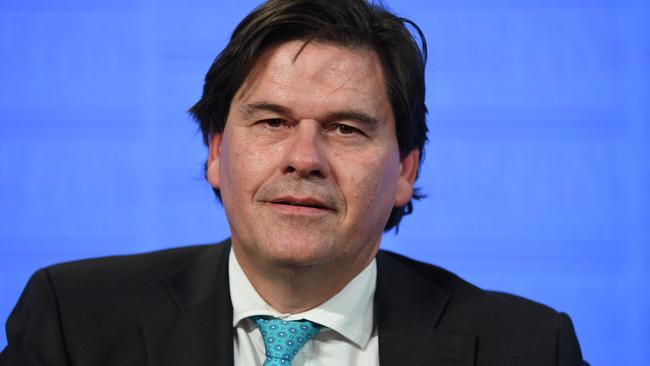Anthony Albanese attacks business call for IR reform, saying wage rises a priority
Labor’s leader criticises business calls for IR reform, saying wage increases must be main focus.

Anthony Albanese has attacked big business’s call to reform the industrial relations system to kick start the economy, saying wage increases should be the main focus of IR reform.
Business leaders today called on Industrial Relations Minister Christian Porter’s IR reviews to look at major changes to the Fair Work Act including current unfair dismissal laws. Mr Porter is already pushing the Ensuring Integrity Bill, which could see rogue unions deregistered.
The Opposition Leader said today that the review was seeking to undermine workers, and linked the freedom of the trade unions to the current debate around press freedom.
“This is a government that is obsessed with further undermining workers’ entitlements. That’s its agenda. They don’t like trade unions, they don’t like organised labour,” he said in Queensland today.
“We have spoken about the freedom of the press. Another essential freedom in a democracy is
freedom of labour to organise. That is an essential component. It’s one that Labor supports, it’s one that the government doesn’t seem to understand in terms of our democracy.”
Mr Albanese rejected the claim by AI Group chief executive Innes Willox that the current IR system’s processes needed to change to help an “ailing economy”, and said wages were the issue.
“What economists are saying is missing in our industrial relations system at the moment is wage increases,” the Labor leader said.
“That’s what they’re saying ... that is really holding back our national economy, that wage stagnation which is there is placing pressure on individual families to pay for the essentials and the like, put food on the table of their families, pay their bills.
“But it’s also having a macroeconomic effect on our national economy and that should be the government’s focus.”

‘Urgent’ reform needed
Employers and industry groups have called for urgent industrial relations reform to lift the “ailing” economy, warning that an overhaul must be part of the next big political debate after the passage of the government’s $158 billion personal income tax cuts “to get our nation back on track”.
Stepping up the case for change to the workplace system, Australian Industry Group chief executive Innes Willox and Australian Resources and Energy Group chief Steve Knott said bipartisanship and a conversation about “serious” economic reform were required to increase productivity and confidence.
The chief executives outlined a wish list of six key priorities they want addressed ahead of what is set to be another clash between the major parties over the government’s revised Ensuring Integrity Bill and Proper Use of Worker Benefits Bill.
“It is clear our economy is neither robust nor in good health. This situation threatens the strength of our communities and our ability to continue to lift living standards,” Mr Willox and Mr Knott write in The Australian today. “Key indicators across the board point to deteriorating national productivity being a major contributor to slowing growth and rising unemployment and underemployment.
“As the RBA warned on Wednesday, interest rate cuts alone won’t do the heavy lifting.
“The Prime Minister recently raised the need for business groups to make the case for industrial relations reform, and we intend to rise to that challenge.”
Demands to overhaul the IR system come as Labor pushes back against a new version of the controversial Ensuring Integrity Bill, which was reintroduced to parliament last week by Industrial Relations Minister Christian Porter, after being amended to more closely align with reforms in the corporate sector and neutralise the opposition’s criticisms.
Opposition industrial relations spokesman Tony Burke said the party still had “significant problems with this bill, which will ultimately hurt ordinary workers”.
“The government’s original legislation was dangerous and extreme and that’s why the Senate rejected it. We note they have now rewritten the bill in a bid to address some of Labor’s concerns,” Mr Burke said.
“We will continue to consult and work through the detail but we will not support a bill that makes it harder for workers to get a fair pay rise. We will not support a bill that could leave workers without the representatives that protect them from wage theft, superannuation theft and dangerous workplaces.”
The six reforms business wants prioritised include the passage of the integrity and benefits bill, which was also amended and reintroduced to the house last week.
They say the better-off-overall test for enterprise agreements should be changed so it applies to “logical groups” of employees and not every employee, plus a definition of a casual employee inserted in the Fair Work Act as “one engaged and paid as such”.
Employers are also pushing for a review of unfair dismissal and adverse action laws to ensure more consistent decisions by the Fair Work Commission, and for enterprise agreements for major projects to apply to the life of the project’s construction instead of the current maximum term of four years.
“We do not seek a wholesale rewriting of the Fair Work Act. What we seek are a few key measures, backed by strong evidence, to make the system work better for all,” Mr Willox and Mr Knott write. “Unduly partisan politics has been a dead weight on substantial reform in recent years and has led in some cases to poor or non-decision-making.
“These issues should be front of mind for all our political leaders. With economic confidence low and unemployment on the rise, failing to act on productivity-enhancing measures carries significant national risks.”
Mr Porter has flagged a review of the nation’s workplace system, which would take six to nine months and could see the government legislate changes before the 2022 federal election. He used the start of the 46th parliament last week to set what he called a “major test” for Anthony Albanese through the reintroduction of the industrial relations bills.
“Clearly, the biggest barrier to reform in this area is the Labor Party,” Mr Porter said yesterday.
“The government respects the role of unions which do the right thing by their members and the wider community and which operate lawfully. But unions which continually flout the law, such as the CFMEU, which has a track record of breaching industrial laws at a rate of three times a week, need to be held to account.
“Is Labor seriously suggesting that we look the other way when it comes to repeated, serious law-breaking by unions and their officials? It’s time for Labor to demand that its key support base, the union movement, show respect for the law and for Labor to act against rogue elements of its union movement. The best way it can do this is to support the Ensuring Integrity Bill.”
The bill would make it easier to ban union officials and deregister unions that do not comply with the law, and introduces a new public interest test that must be satisfied before registered organisations can merge.
The government also wants better financial governance and transparency of registered organisations and associated entities, including worker entitlement funds that hold an estimated $2 billion in entitlements such as redundancy money. Employers say the money they contribute is being “siphoned off” by unions.
Both IR bills have been referred to a Senate committee, which is not due to report until October 25.
An ACTU spokesman said the movement wanted penalty rate cuts reversed, a living wage introduced, the “failing” bargaining system fixed by giving workers greater support and bargaining power, and a reduction in the number of insecure jobs.
The ACTU lashed the definition of casual work proposed by employers, saying it should “not be for employers to arbitrarily determine this as the government has proposed”. “We support multi-employer bargaining as suggested by (Australian Small Business and Family Enterprise Ombudsman) Kate Carnell — this should be an available option for workers and their unions,” the spokesman said.
“The regressive bills that the Morrison government has introduced to the parliament are dangerous and extreme.
“They undermine people’s right to freedom of association. It is important that people are free from government and employer interference so they can join unions and elect representatives who fight for pay rises and to protect jobs and workplace safety.
“Weakening working people’s rights by reducing protections from being unfairly dismissed as well as allowing employers to make permanent jobs casual will reduce the job security of all workers.”
Mr Porter said he would consult union leaders and industry groups “to discuss what improvements can be made within my industrial relations portfolio to increase jobs and wages growth and strengthen the economy”.



To join the conversation, please log in. Don't have an account? Register
Join the conversation, you are commenting as Logout